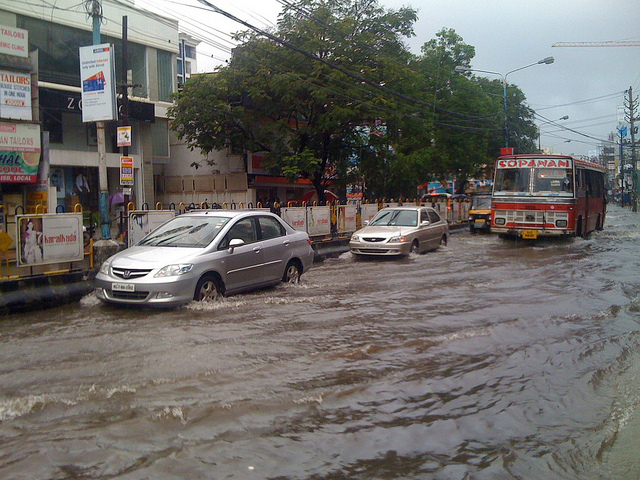Crisis in Kerala, केरल में संकट Posted by Rachael on Aug 20, 2018 in Uncategorized
During the past week, as billions of people in India and across the globe celebrated India’s Independence Day on August 15th, an unsettling reality has descended on the country. The extreme flooding in the southwestern state of Kerala has gripped the nation with terror. Even those who live far from this state feel compelled to donate their time and money to help those in need. If you’d like to keep abreast of this catastrophe in the state of Kerala, I recommend following Indian news sources, such as BBC Hindi, The Hindu and The Indian Express. Kerala is ordinarily known for its delicious and varied cuisine, its high literacy rate (a phenomenal 93.9%, the second highest of any state in the country) and its magnificent backwaters where visitors and locals can vacation on river boats to enjoy the stunning scenery. This scenery, however, also poses a problem for the state: with such close proximity to the ocean and an abundance of water generally in a low-lying area, this state is unfortunately vulnerable to extreme flooding, as we are witnessing now.
https://www.bbc.com/hindi/india-45233663
The above article details how the Gulf countries (खाड़ी देश), specifically the United Arab Emirates (U.A.E.), have aroused support for Kerala, on whose people they depend to a great extent for labor. The U.A.E.’s Vice President (उपराष्ट्रपति/uprashtrapati) and the prince (शासक/shaasak) of one of its major cities, Dubai, Sheikh Mohammed bin Rashid Al Maktoum, did this by tweeting to spread awareness of the flood and arouse sympathy for the people of Kerala. In one of his tweets, posted on Friday evening, he promised immediate help (तत्काल मदद/tatkaal madad) to those affected by the flood (बाढ़ पीड़ित), expressing himself both in English and Malayalam (मलयालम) the native tongue of most Malayalis or people from Kerala.
In this tweet, he states that, as the Malayali people have been so integral to the economic success (सफ़लता) of the U.A.E., Emiratis should shoulder the responsibility (ज़िम्मेदारी) of repaying this debt of gratitude by helping their brothers (भाई), as he refers to the people of Kerala. He goes on to describe the flood as terrible (भयावह) and mentions the hundreds (सैकड़ों) of people who have already died and those who have become homeless (बेघर) due to this natural disaster (प्राकृतिक आपदा). He states furthermore that, especially in these holy and auspicious days (specifically, the holiday of बकरीद, which Muslims everywhere are celebrating), Emiratis should not forget to help their neighbors.
The Gulf countries have a special relationship with Malayalis, as Keralites live in these countries in large numbers (बड़ी संख्या में) to work. Another Gulf leader who has shown his support is the prince (शासक) of Sharjah (U.A.E.), Sultan bin Mohammed Al-Qasimi, who gave 4 crore rupees (करोड़, one crore is equivalent to 10 million rupees, so, stated another way, the Sultan gave 40 million rupees) to help the disaster efforts. In addition, Malayalis from the Malayali Association, (मलयालियों की एसोसिएशन) which is based in the Gulf countries, have also been sending large amounts (राशि) of money to loved ones and compatriots residing in Kerala.
According to estimates (अनुमान के मुताबिक), the number of Malayalis living in the Gulf countries is truly staggering. In total (कुल मिलाकर), it is likely that 10% (फ़ीसदी) of Kerala’s population does not reside in the state (राज्य or प्रदेश) itself. In other words, out of very three homes in Kerala, one person lives and works in the Gulf countries, which includes Kuwait, Qatar, Oman, Bahrain, the U.A.E. (of course) and Saudi Arabia.
As per his duties, the prime minister (प्रधानमंत्री) of India, Narendra Modi, also travelled to Kerala to assess (जायज़ा लेना) the damage of the floods. While there, he attended a meeting (बैठक) with the chief minister (मुख्यमंत्री) of Kerala, Pinarayi Vijayan, to discuss appropriate next steps in disaster relief. After this meeting, an announcement (घोषणा) was made to pledge 500 crore (5 billion rupees) for rescue and relief operations (बचाव और राहत कार्य) that will be essential to the state’s recuperation. The prime minister also pledged money to those whose family members have died in the flood (बाढ़ से मरने वालों के परिजन).
In addition to the loss of life and homelessness caused by the flood, it has also caused numerous landslides (भूस्खलन) throughout the state, intensifying the destruction. As part of the relief efforts once the state’s people have partially recovered from the disaster, roads connecting different cities will need to be rebuilt, as they have been destroyed under the water’s pressure. Moreover, the state’s public transportation system (सार्वजनिक परिवहन व्यवस्था) will need to be rebuilt. Officials (अधिकारी) estimate that 4 lakh (लाख, or, in other words, 400,000) people are now residing in relief camps, living with the fear that food may run out and cause a famine (अकाल).
In addition to aid from the Gulf countries, numerous chief ministers of various states in India have pledged large amounts of money for the aid and relief of Kerala. Unfortunately, this is not the first time a terrible flood has struck the beautiful state of Kerala. In 1924, Kerala was hit by a destructive flood that was responsible for the deaths of hundreds of people and destroyed the homes of 200,000 Malayalis. The good news is that 15,000 people have, so far, been relocated to safe places and, as we’ve seen, people from around the world are ready to come together, despite their differences, to help this beautiful state in its time of urgent need.

Build vocabulary, practice pronunciation, and more with Transparent Language Online. Available anytime, anywhere, on any device.






